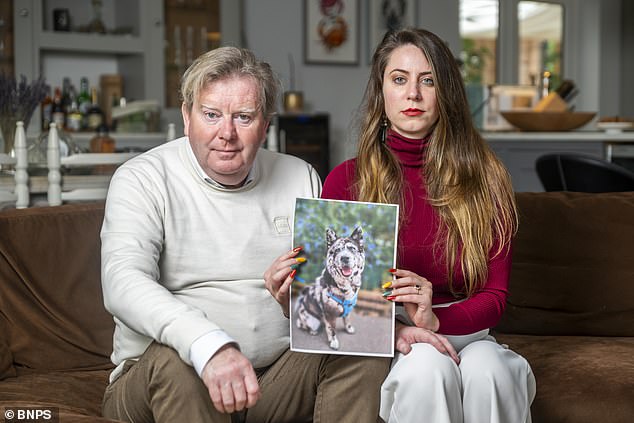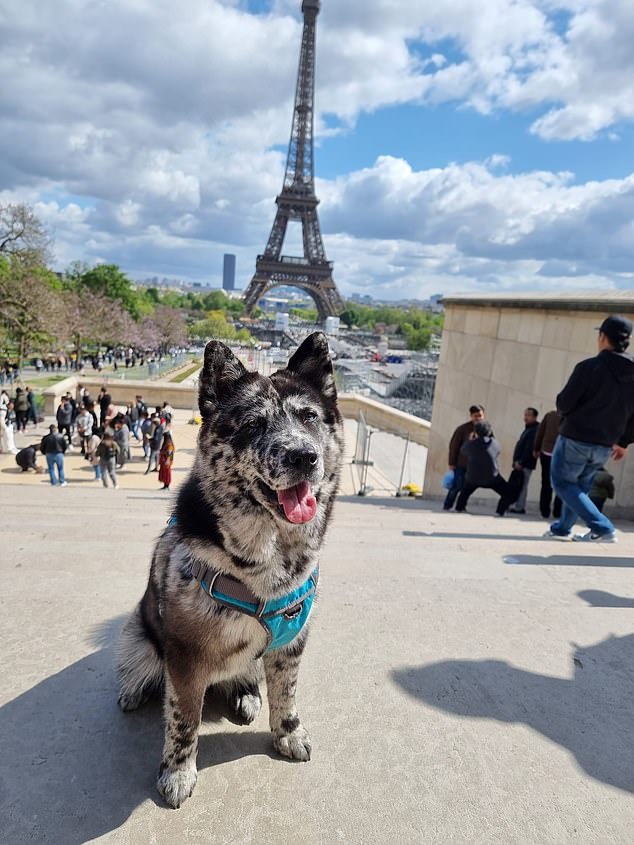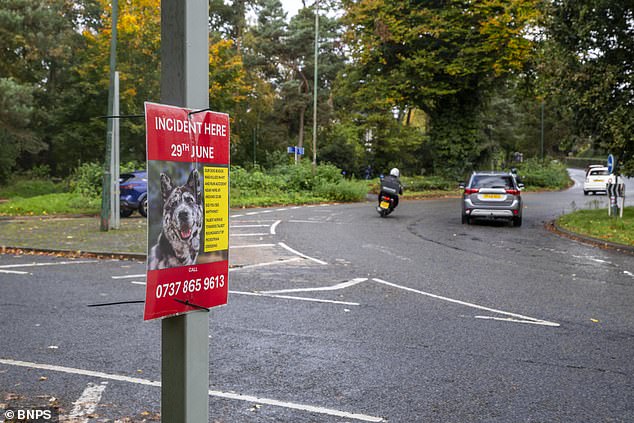I’m paying £40k to CLONE my dog after it was killed by a mystery hit and run driver… but here is why it is worth every penny
A heartbroken couple will pay a US pet cloning clinic almost £40,000 to bring their dead dog back to life after she was killed by a mystery driver.
Dominika Sojka, 34, and her partner Ian Clague, 62, lost their 10-month-old puppy Bijoux on June 29 after he escaped from the garden of their £1million home in Bournemouth and was hit by a car.
The unknown driver did not stop at the scene or call the police, which under British law is the legal duty of any motorist who hits a dog.
Bijoux’s body was taken to a nearby veterinarian by an anonymous driver. A man the couple believe was behind the death of their dog, given his refusal to make contact despite their pleas to staff.
The couple was left with a mix of loss and injustice – and many questions about what happened on that fateful summer evening to their beloved chow-chow/husky cross – or Chowsky.
Dominika Sojka, 34, (centre) and her partner Ian Clague, 62, (left) lost their 10-month-old puppy Bijoux (right) on June 29 after he escaped from the garden of their £1million home in Bournemouth and was hit by a car by a car

Now the heartbroken couple will pay US pet cloning clinic Gemini Genetics $50,000 (£38,536) to bring their dead dog back to life after she was killed by a mystery driver.

In the wake of the tragedy, Ian and Dominika are calling on all drivers to be aware of their legal duty to stop at the scene and call the police if they hit a dog.
Just days after the accident and while Bijoux’s body was at the vet, Dominika, a private jet broker, was “not ready to say goodbye.”
She remembers, “She was gone so quickly. I looked for ways to keep her, I thought about filling her up, but then I thought I didn’t want her body to be disturbed in any way.
‘Then I thought maybe I could clone her, which I didn’t think was really possible, but when I looked it up I realized it was possible in America. I was like ”wow”.
‘So I googled to see if you can do it in the UK, and I found a company called Gemini Genetics. I contacted them and asked if we could clone Bijoux somehow.
‘They said they could do that by taking Bijoux’s DNA, they just needed a small piece of skin.
‘However, she was in the freezer at the vet, which they said was a problem because a frozen dog’s cells could be dead. They said they couldn’t guarantee it would work.
‘But they managed to retrieve her cells and the DNA, they froze it at -197C.’
Ian, who owns and runs an engineering company, said: ‘They grow the cells to make sure they have a lot of cells and then they freeze it so they have a preserved sample, and you pay a certain amount for it. That.
‘But then the real cost is cloning the animal, and that is done in the US because it is not legal in Britain. But you can import your cloned dog once it’s alive.

In the wake of the tragedy, Ian and Dominika are calling on all drivers to be aware of their legal duty to stop at the scene and call the police if they hit a dog.

Just days after the accident and while Bijoux’s body was at the vet, Dominika, a private jet broker, was “not ready to say goodbye.”
“We met the founder of Gemini Genetics, and he introduced us to his two-year-old cloned dog and he was lively and jumping and everything you would expect.”
“They live as long as any other animals,” Dominika added.
Ian said: ‘We haven’t cloned her yet, she’s frozen at the moment. It’s quite expensive to revive her, around $50,000 (£40,000).
“But at some point we might. We’re just waiting until we get the money together.’
Dominika said: ‘It gives me hope. I know it won’t be exactly the same dog; they’re twins. The colors will be the same, but the way the surfaces are will most likely be different.
‘But the shape and everything else will be the same as Bijoux. So as long as there is still pain from death, she will come back to us.”
Despite their research into cloning Bijoux, the accident itself still loomed large for Dominika and Ian.
They were so desperate for answers that they hired a private animal detective to track down the driver.
But his investigation ultimately led nowhere and the local police dropped the case.

Under British law, a driver who hits a dog must stop and report the incident to the police. However, this legal obligation does not apply if a cat is involved
Dominika added: ‘She was so sweet, very sweet and loved other dogs. She always ran to us in the morning and said hello by jumping on our bed.”
Ian said: ‘Bijoux really loved the forest. She loved to chase a hare, a rabbit or a squirrel – not that she ever caught one.’
In a message to the unknown driver, Dominika said: ‘You hit our dog. The least you can do is pick up the phone and call the police.
‘I have so many questions, but zero answers. It would really help with closure.”
Ian added: ‘If the driver had called the police at the time we might never have had to go through this.’
In the wake of the tragedy, Ian and Dominika are calling on all drivers to be aware of their legal duty to stop at the scene and call the police if they hit a dog.
On Wednesday, animal welfare charity Blue Cross launched the Blue Cross Code, a new safety initiative encouraging drivers and pet owners to be more alert to risks on the road.

It is estimated that 80,000 dogs and 230,000 cats are hit by cars on UK roads every year
Research from the charity shows that the majority of British drivers would be breaking the law if they hit a dog with their vehicle.
The survey found that 86% of drivers would not call the police if they injured a dog and there was no owner in sight – and that number rose to 91% among young drivers aged 18 to 24.
Under British law, a driver who hits a dog must stop and report the incident to the police. However, this legal obligation does not apply if a cat is involved.
It is estimated that 80,000 dogs and 230,000 cats are hit by cars on UK roads every year.
